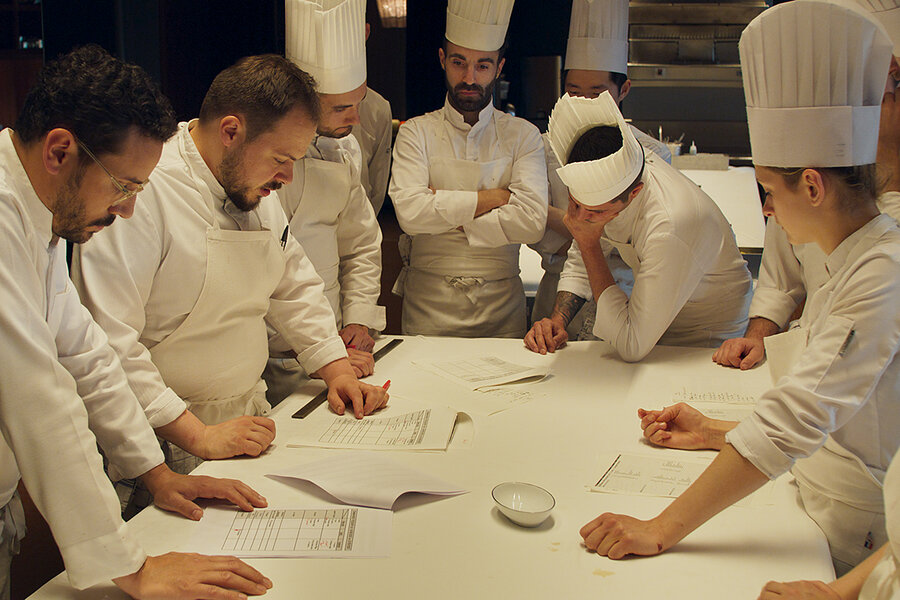Bring your appetite: Wiseman’s latest film is a feast for the eyes
Loading...
Frederick Wiseman’s “Menus-Plaisirs – Les Troisgros” is a four-hour documentary about a legendary French restaurant, Le Bois sans Feuilles, in the bucolic Loire countryside. I wasn’t bored for a moment. To call it “immersive” is an understatement.
Foodie shows have been so overexposed on television that the effect of this film comes as something of a shock: For once, we are experiencing the culinary arts through the eyes of a master observer.
For almost six decades, and 44 documentaries, Wiseman has looked into the workings of institutions – high schools, juvenile courts, zoos, metropolitan hospitals, ballet companies, welfare offices, city halls, and much else. In practically every instance, what unfolds has the depth and amplitude of a major novel. He dispenses with narration, interviews, and scored music on the soundtrack. Events are presented without any editorializing or overt intervention. Wiseman’s vision in “Menus-Plaisirs” accumulates before our eyes, and it has a kind of purity. It’s as if we were looking at even the most commonplace things afresh.
Why We Wrote This
Frederick Wiseman has made a career of documenting the intricacies of institutions. Now he trains his lens on a family-run French restaurant. Besides being a delight for foodies, the Monitor’s film critic says, it’s also a moving commentary on life.
The famed Troisgros restaurant was founded in 1930 and for four generations has been owned and operated by the family, earning a three-star Michelin rating for the past 55 years. Although the family runs several other establishments, the film’s primary focus is on Le Bois sans Feuilles. Its engagingly huffy maestro, Michel Troisgros, is preparing to hand over the reins to César, his eldest son and head chef. Almost imperceptibly at first, “Menus-Plaisirs” – which translates into English as “small pleasures” – becomes a family saga. The torch, rather ruefully, is being passed.
The daily operation of the restaurant for lunch and dinner is only part of the picture. But what an operation it is, as the crew prepares the menu for the day. They notate in advance the preferences and allergies of the guests, most of whom seem to be captivated by the soft splendor of the occasion. (One of the diners jokingly says, “My only allergy is to the bill.”)
The nouvelle cuisine recipes are tested and altered and worried over until perfection is achieved. Kidneys, passion fruit, rack of lamb, rhubarb, perch, frog legs, crawfish, snails, and lots more are examined with the kind of granular scrutiny one might expect from a high-stakes chemistry experiment. As Wiseman has said in interviews about the making of the film, which he also edited, the effect “was like being in the studio of great artists.”
Away from the restaurant, we see Michel, César, and his brother Léo scout the fresh vegetable market and local fishmongers. We look in on a backyard garden, an organic cattle ranch, a vineyard, and a cheese-processing plant. The cheese expedition is especially revealing. Wine aficionados have nothing on cheese mavens. “Each cheese has its moment of truth,” exclaims an expert in the cave where they are ripening.
What I wasn’t expecting as I watched “Menus-Plaisirs” was how moving it became. It transcends being a movie only about the culinary experience. Michel and his crew are indeed artists, and their perfectionist passion shines through everything they do. It’s the same kind of passion that informs Wiseman’s vast filmography and no doubt drew him to this world. At 93, he has an undiminished avidity for capturing workaday revelations. The people in his documentary have an almost pantheistic appreciation for the natural elements – the sea, the soil, and the seasons – that provide the life blood for their devotion. Guardians of an age-old tradition, they are also carrying that tradition forward. Clearly they are in awe of doing so.
What is so poignant about culinary art, especially as practiced at this level, is its transience. Masterpieces are created only to be consumed. It’s all a beautiful, sensual vanishing act. The workings of a food establishment are ostensibly what is on view here, but the movie is really about the passage of life.
Peter Rainer is the Monitor’s film critic. “Menus-Plaisirs – Les Troisgros” is not rated. It is in French with English subtitles.








